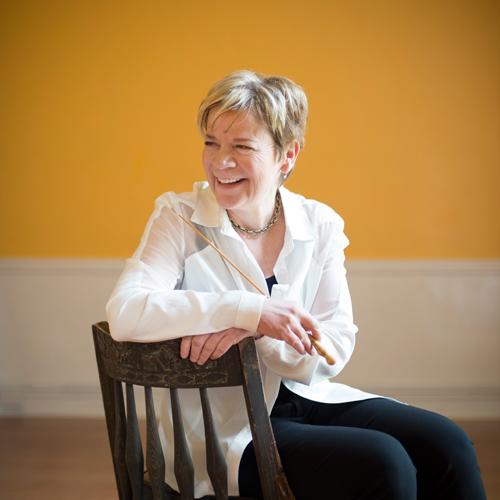Marin Alsop: Innovator and Rebel
January 16, 2009
Photo: Adriane White
Marin Alsop is recognised as one of today’s leading conductors and boasts a number of outstanding Naxos recordings. She recently shared some thoughts about her career with Stephen Schafer, Editorial Manager for Naxos International Marketing.
STEPHEN: Your Naxos discography is very wide, embracing music by Romantic and modern composers from both sides of the Atlantic as well as some less familiar works. So which composers and what repertoire do you find particularly exciting to conduct?
MARIN: I think that the breadth of repertoire that I have recorded for Naxos does indeed represent the wide spectrum of music that interests and intrigues me. My main repertoire and first love lies with the standard repertoire from the 18th and 19th centuries with a special focus on the Romantics: Schumann, Brahms, Dvořák, Wagner, Mahler, Tchaikovsky, Richard Strauss. With Naxos I have been able to record an incredibly wide range of repertoire: from Takemitsu to Weill and from Brahms to Mahler. The Americans of yesterday and today also interest me. From Barber, Harris, Bernstein and Copland to Adams, Corigliano and Rouse.
Repertoire focus and interest changes as I grow and change. Currently I am conducting a lot of Mahler and Dvořák, two composers who feature prominently in these first years of mine in Baltimore. Next season Bartók will move into focus and last season Beethoven figured large…so, this seemingly simple question is IMPOSSIBLE for me to answer.
I love conducting so many varied works from so many different periods and heritages that it’s really impossible for me to answer simply. Something that I do a lot of is to explore a composer in depth for my audiences. For example, I did several Brahms Festivals, a Robert Schumann focus last season, Tchaikovsky this season, etc. Bringing context and relevance is an important component for me with my listeners. I like doing the features with Scott Simon on NPR; my new series in Baltimore called “Off the Cuff” and narrated program notes for the Naxos site. I think all of this additional information offers a deeper experience for the listeners.
STEPHEN: Have you a particular ‘mission’ that guides the music you perform?
MARIN: In programming a season I try to offer a wide variety of repertoire throughout the season and in each program, held together by larger themes throughout the season. I think we underestimate our audiences and their capacity for, and interest in, learning more and feeling engaged and enhanced by the concert experience. I try to make every concert an event that people can delve into at any level that interests them. Again, context is critical for me.
STEPHEN: Are there any personal favorites that you’d like to record?
MARIN: I would like to record the Robert Schumann Symphonies, eventually complete a Mahler cycle, finish up my Brahms cycle with the Requiem and assorted works. I think these are all on the horizon.
I’d also love to do a Stravinsky cycle and Strauss cycle…we’ll see!
STEPHEN: This is an inevitable question, given the gender-imbalance among conductors: have you faced particular challenges as a woman establishing yourself as a conductor?
MARIN: I think that’s really impossible for me to answer. Establishing oneself as a conductor is challenging regardless of gender so I never felt that I faced greater hurdles than my male colleagues.
STEPHEN: Do you think that there are more opportunities for female conductors today than in the past?
MARIN: Yes, but still not enough. I have founded a fellowship for talented young women conductors called the Taki Concordia Conducting Fellowship (TCCF) to create more opportunities for these women to be seen by major orchestras and gain experiences that will help them further their careers.
STEPHEN: Does gender even make a difference anymore?
MARIN: Gender always makes a difference—just look at human history. That said, I have NEVER felt any resistance from orchestral musicians. If my primary goal is always the music, that’s all they care about.
STEPHEN: What advice would you give to young musicians, whether male or female, who are just starting out?
MARIN: Follow your passion and if doors seem locked, figure out ways to climb in a window! Perseverance is really the key to success, in my opinion.
STEPHEN: There’s a lot more to conducting than simply turning up and waving your hands in front of an orchestra (!). But few music lovers would know much about the preparation or behind-the-scenes work. Could you give us an idea of what’s involved?
MARIN: There’s an enormous amount of studying the scores, reading about the composers, grasping the history of the time in which the piece was written and trying to get to the true intent of the composer. THEN there’s the physical gesture part that really needs to convey, through body language, all of these things. Working out and on these gestures requires enormous time to develop and hone.
STEPHEN: We read and hear a lot about how classical music is not popular, even elitist or irrelevent, and about how audiences are getting smaller and the classical record industry is in crisis. What’s your view about the importance of classical music today?
MARIN: There are arguably more people attending “classical” music performances today than ever before in history. I believe that the issues of elitism and irrelevance come from a gradual and extreme formalizing of the concert experience; several decades of intellectually inscrutable new music and a lack of contextualizing and curating the concert experience for people. All of these issues are changeable and changing. In Baltimore we now offer our listeners tremendous online support pre and post concert; we are taking the negative formality out of the concert experience and offering a wide variety of presentation models, including a new, very popular series called “Off the Cuff” where I speak in depth about a composer and piece and then we perform it; when we did a Beethoven cycle last season, we also offered a program called CSI Beethoven where we teamed up with doctors from JohnsHopkins to explore the cause of Beethoven’s death; our listeners and extended audiences are downloading our performances on iTunes and uploading my podcasts and “webumentaries”; the success of the Naxos music library itself is indicative people’s interest in listening to classical music.
STEPHEN: Is it inherently a ‘conservation program’ for the works of ‘dead, white males’? Is it only for a select minority of mainly old people? Or is it something more vital, forward-looking and important for everyone? Do you consciously try to break down barriers (real or perceived), try new ways to bring classical music to people? Do you think that classical music needs to be ‘packaged’ in new ways these days or are traditional concerts and recordings actually the best way to go?
MARIN: When you go to a museum, do you expect to only see artwork that you’ve seen before? Of course not! That should apply equally to classical music. Hearing a familiar masterpiece next to a new work informs and impact BOTH listening experiences.
STEPHEN: Could you tell us about your forthcoming Naxos recordings?
MARIN: My next releases include the second American recording of Leonard Bernstein’s Mass, one of the great American 20th century masterpieces, in my opinion. This is a work that broke ground on every level. It is a multi disciplinary theater work that crosses stylistic, political and social boundaries in novel and inspiring ways. Written for the opening of the Kennedy Center in 1972, Mass challenges us to think about faith, humanity, war and responsibility…what could be more relevant today?
Mahler’s Symphony No 1 is a work that I’ve aspired to record and am thrilled to have on CD with my wonderful Baltimore Symphony. It is a showcase for an orchestral and a piece that heralds the advent of the 20th century. Bernstein called Mahler the “prophet of the 20th Century” and I agree. Mahler delves into the psyche in new and profound ways, echoing the work of his contemporary, Sigmund Freud. It was a monumental time in human history and this symphony signals its birth.
I am also looking forward to the release of our next two CDs in the Dvořák cycle. The 9th Symphony met with such a great response, and I think the others sound even more thrilling!
STEPHEN: On a more personal level, how do you balance work and private life? Are these spheres necessarily separate or are they complementary? What do you do when you have time to relax?
MARIN: Work and private life are complementary, not exclusionary, for me. Becoming a parent later in life has been a wonderful revelation and I feel that I am able to enjoy the richness of the experience even more as a result.
STEPHEN: Had you not become a world-famous conductor, what career might you have followed?
MARIN: I think I would have been some type of manager or politician. Galvanizing people to achieve an end goal is my true following, I think.
STEPHEN: What does the future hold for you—any special plans, projects or things that you’d like to achieve?
MARIN: I feel that I am entering a new phase of my artistic growth and starting to focus on larger scale, far reaching, interdisciplinary projects. Although I am not yet at liberty to share the details, 2009–10 and 10–11 will both be dominated by major scale projects that I am developing with fascinating creative partners.
STEPHEN: Given carte blanche (and a blank check!) to achieve any musical goal—what would you do?
MARIN: I would expand the new educational program that we recently launched in Baltimore, called ORCHKIDS, to reach as many early elementary kids as possible. I would create an entire original educational series—of music to play, listen to and learn from—for these kids—that could be used worldwide.
I would be happy to partner with Naxos on its goal!
STEPHEN: Is there anything else that you’d like to share?
MARIN: We are entering a new age of digital and artistic experimentation and I am proud to call Naxos, a compatriot innovator and rebel, my record label!
STEPHEN: Thanks so much for giving us an insight into your world.
MARIN: My pleasure.






























